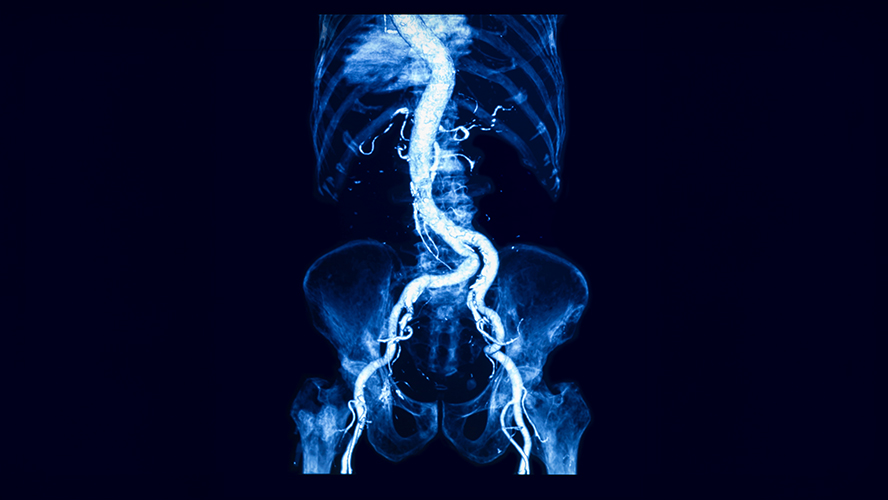
Abdominal aortic aneurysms (AAAs) are a silent but deadly threat and a leading cause of death in men over 65 in Canada. Currently, there are no treatments to prevent the growth and rupture of these aneurysms. New research from UHN has uncovered how AAAs form and the impact of smoking, potentially opening the door to targeted treatments.
Although initially asymptomatic, AAAs are defined as a swelling of the abdominal aorta—the portion of the aorta that carries blood from the heart to the abdomen. Progressive weakening and dilatation (being stretched or widened) of the vessel wall make it more likely to rupture, which is a surgical emergency and results in death in 50% to 85% of patients. There is limited understanding of how AAAs form and how risk factors such as smoking and arterial plaque buildup contribute to clinical outcomes.
A team led by UHN’s Dr. Clinton Robbins and collaborators used pre-clinical lab models to mimic these risk factors: cigarette smoke exposure and high cholesterol. They found that cigarette smoke drove aneurysm formation by damaging the cells that line the aorta.
Genetic sequencing techniques revealed that this damage triggered inflammation and caused immune cells called macrophages to gather within arterial plaque, where they release enzymes that degrade the elastic fibres of the aortic wall—eventually causing it to expand and rupture like a balloon.
The study also identified a specific type of inflammatory macrophage that was consistent across both pre-clinical lab models and humans, and was central to this destructive process.
“This research sheds light on how smoking worsens AAA and pinpoints the immune cells behind the destruction,” says Dr. Clinton Robbins, Senior Scientist at Toronto General Hospital Research Institute. “It could open the door to new treatments that target these harmful pathways—potentially stopping aneurysms before they burst and become fatal.”
Co-first authors of the study include: Dr. Danya Thayaparan, former Postdoctoral Researcher at McMaster University and current Scientific Advisor at GSK; Dr. Takuo Emoto, Researcher at Kobe University Graduate School of Medicine and former Postdoctoral Researcher at Toronto General Hospital Research Institute (TGHRI); Dr. Aniqa B. Khan, Doctoral Candidate at TGHRI; Dr. Rickvinder Besla, former Doctoral Student at TGHRI and current Senior Scientist at Merck; Dr. Mahmoud El-Maklizi, Postdoctoral Researcher at TGHRI; and Homaira Hamidzada, Doctoral Student at TGHRI.
Drs. Emoto and Khan are also co-corresponding authors on the paper.
Dr. Ken-ichi Hirata, Researcher at Kobe University and Dr. Martin R. Stampfli, Professor at McMaster University, are co-senior authors of the study.
Dr. Clinton S. Robbins, Senior Scientist at Toronto General Hospital Research Institute and Associate Professor in the Department of Laboratory Medicine and Pathobiology at the University of Toronto, is a co-corresponding and co-senior author of the study. Dr. Robbins is a Tier 1 Canada Research Chair in Cardiovascular Immunology and the Peter Munk Chair in Aortic Disease Research at the University Health Network.
This work was supported by the Canadian Institutes of Health Research, the Flight Attendants Medical Research Institute, the Japan Society for the Promotion of Science, the Japan Agency for Medical Research and Development, the MSD Life Science Foundation, the Japan Foundation for Applied Enzymology; and the Naito Foundation, University of Toronto’s Medicine by Design, and the Government of Canada, and UHN Foundation.
Thayaparan D, Emoto T, Khan AB, Besla R, Hamidzada H, El-Maklizi M, Sivasubramaniyam T, Vohra S, Hagerman A, Nejat S, Needham-Robbins CE, Wang T, Lindquist M, Botts SR, Schroer SA, Taniguchi M, Inoue T, Yamanaka K, Cui H, Al-Chami E, Zhang H, Althagafi MG, Michalski A, McGrath JJC, Cass SP, Luong D, Suzuki Y, Li A, Abow A, Heo R, Pacheco S, Chen E, Chiu F, Byrne J, Furuyashiki T, Husain M, Libby P, Okada K, Howe KL, Heximer SP, Yamashita T, Wang B, Rubin BB, Cybulsky MI, Roy J, Williams JW, Crome SQ, Epelman S, Hirata KI, Stampfli MR, Robbins CS. Endothelial dysfunction drives atherosclerotic plaque macrophage-dependent abdominal aortic aneurysm formation. Nat Immunol. 2025 May;26(5):706-721. doi: 10.1038/s41590-025-02132-8.




